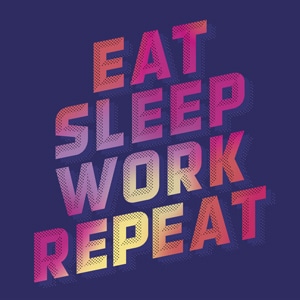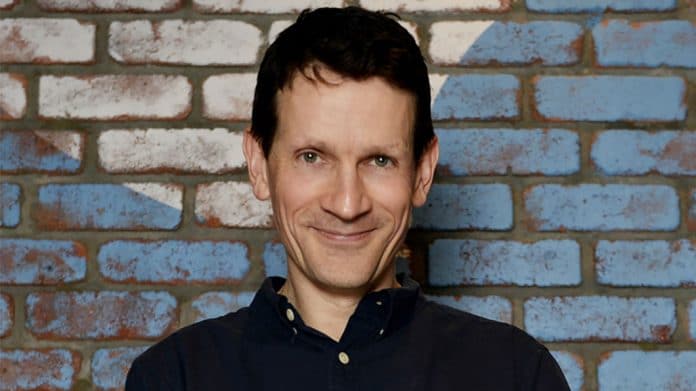Bruce Daisley, Twitter’s EMEA Vice-President, and creator of the popular podcast Eat Sleep Work Repeat is on a mission to educate the market about taking a studied approach to work pressures and the eternal struggle for achieving a happy work/life balance. Drawing on elements of science and psychology, Daisley presents cogent arguments. Publications UK Managing Editor, Zoya Malik, caught up with him to get his views on how those ideas apply to individuals and firms operating in the SME sector
Although the term “Work Life Balance” has been in common use since the 1980s, businesses across the globe have been referring to this equation, in one form or another, from the 1930s. In fact, the Industrial Revolution marked the start of a significant shift in the way that our lives are structured but, as a society, this issue has come to the fore over the past 50 years as the rise of mega corporations and the employment needs of a growing population have created increased pressures on those in work. As Daisley says, “even business leaders are presenting bad examples of how we should be working. Elon Musk brings us clever innovations but he is being quite a bad role model in terms of the hours that he works and he serves as a cautionary note.”
Elon Musk is not alone. For example, the nature of work in start-ups can be, and often is, formative. As a result, the art of being “seen” to do “things” becomes a common narrative but that isn’t always positive or productive. Whilst operational tasks are structured and, by their very nature, can consume resources, Bruce Daisley states that “there is plenty of evidence to suggest that working long hours can stifle your creativity especially if your job requires you to be inventive.” The same principle can stifle decision-making. Daisley continues, “We now expect that SMEs and start-ups are trying to hustle business all the time but this is leading to burnout. It doesn’t have to be like this.” He references Daniel Levitin’s “The Organised Mind,” in which Levitin posits that our brains are able to only make a limited number of important decisions per day and that, attempts at anything beyond that can be counter-productive. Consequently, many of those crucial decisions made after-hours at the office or late night under duress (especially when trying to get a start-up on its feet), can end up being disastrous.
People are reluctant to share stories about how exhausted they are; about how they are at a breaking point i.e. a lot of people live in denial. Daisley emphasises the need to challenge people, who miss lunch breaks or do “weekend emails,” that they’re not actually being more productive. With a limited number of energy blocks per week to use our cognitive powers, Daisley cites scientific evidence that sleeping more will lead to greater success. “Somehow we have reached a conclusion that successful people sleep less but that isn’t really the norm. My objective is to give an honest appraisal of the evidence and the evidence is that working long hours isn’t necessarily good.”
Daisley is critical of Jack Ma’s support of the Chinese Government’s suggested 996 policy i.e. encouraging firms to work from 9am to 9pm, 6 days a week. This view appropriately echoes the rumblings in Chinese society where Weibo users are starting to question what will happen to family life and the fabric of society, if workers are too exhausted to care about any other activity or, worse, care about family life.
Perhaps surprisingly, Bruce Daisley doesn’t use social media products. He clarifies, “I use social media to stay connected to the news and I use social media like twitter for a laugh. So switch off notifications! I started Eat Sleep Work Repeat because of my own experience and the fact that I was witnessing something remarkable in work, that people were exhausted. I started exploring the science of modern working and was astonished to see how little of the way we work right now is validated by the evidence.” He explains, “The first job I was in was chaotic but there was great camaraderie. Anyone can create a good environment and all of us then changed the dynamic and challenged the way things were. I learned anyone can have scope to do this. I learned that bosses try to exert control because they feel powerful but, amazingly, at another place I worked, the receptionist was driving cultural change. Even now, we still listen to the opinions of rich bosses, rather than the evidence. Hence a burnout epidemic affecting the whole workforce. I think Jack Ma’s objective is the same as every CEO’s, he wants people to do good work promising great (but undefined) rewards in the end. Thankfully the evidence suggests that working a 996 isn’t the way to do that.” With the growing resentment in China towards this policy, Daisley seems to have a point.
Concerns about poor decision making, lack of clear strategic thinking, burnout etc. apply as much to SMEs and start-ups as they do to the corporate sector. An entrepreneur’s desire to see his/her “baby” succeed can, oftentimes, blind them to the lessons being learnt through scientific research and analysis; that seeking a workable compromise between work and rest is a key component to that success, especially when you need to invent or innovate to keep your commercial ambitions on track.
Ownership, management and staff productivity is often sourced through the resulting sense of well-being and happiness and thought-leader’s like Bruce Daisley are trying to inspire businesses, small and large, to look at cultural changes that put the onus back on finding the right balance.

Listen to Bruce’s podcast Eat Sleep Work Repeat, to reassess your company’s approach to create a work-life balance for all


